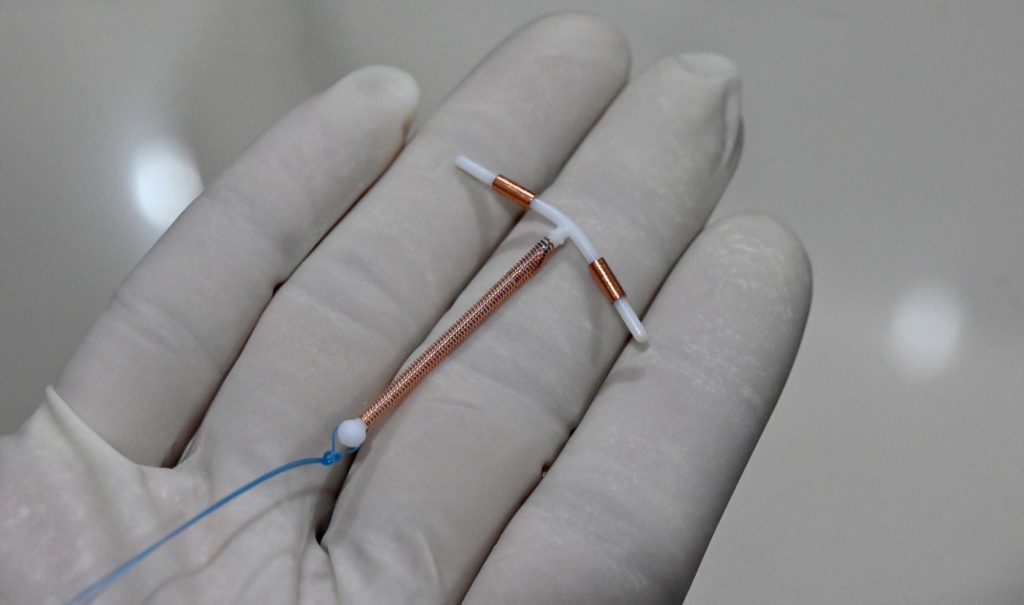(Bloomberg) — As the striking reality that the U.S. could soon rollback abortion rights comes into focus, women are flooding social-media platforms to express outrage, but also to share plans on what to do in preparation. Online searches surged for over-the-counter emergency contraceptive medication, while some people started setting up appointments to get intrauterine devices, also known as IUDs, a longer-term form of birth control.
Arlin Téllez, a 23-year-old student at Trinity Washington University in Washington D.C., on Tuesday scheduled an appointment through her college to get an IUD. With abortion rights hanging in the balance, she worries about losing access to contraceptives and birth control in the future.
“We have to prepare for contraceptives to also be targeted. At this point, the possibilities are endless, so I’d rather be prepared,” Téllez said. “As someone in their early 20s, I am not ready to be a mother.”
The hours following the leak of a draft majority U.S. Supreme Court opinion that would overturn Roe v. Wade have been frenzied with reaction as women, transgender and non-binary people contemplate a future without a constitutional right to abortion. Groups like the Women’s March organization and Rise Up 4 Abortion Rights have called for rallies and protests. Blue-state governors and politicians hailed their commitment to reproductive rights, while President Joe Biden said he’d seek to enshrine the protections of the landmark case into U.S. law.
Women like Sara Sanchez also started loading up on over-the-counter emergency contraceptive pills. Sanchez, 43, said she had started buying a pack of the brand Plan B One-Step once a month after Donald Trump was elected president in 2016. When news broke about the Supreme Court’s majority draft opinion, she immediately panic-bought 24 packs of Plan B on Amazon to stockpile for her friends in Chicago and for herself.
“We’re already in a reality where individual states are going to limit women’s access to FDA-approved options to deal with their own body and their own life,” Sanchez said. “It seems like a thing that I could do in the face of feeling very disempowered.”
Data from Google trends showed that interest for “buy Plan B online” surged more than 160% in the past seven days, with the bulk of that jump coming after the news broke.
Read more: Abortion-rights activists plan rallies
Several pharmacy chains didn’t immediately respond to questions about whether they had seen an uptick in sales of Plan B pills. A CVS spokesperson said emergency contraception continues to be available at CVS Pharmacy locations.
Some Twitter users did, however, push back on efforts to hoard emergency contraceptives, saying that doing so could reduce access to individuals who may urgently need the pills, and suggested that people should instead turn to distribution networks and mutual aid systems to dole out the medication.
Plan C, a nonprofit that provides information about how to obtain medically-safe abortion pills online, on Tuesday saw a 10-fold surge in visits to its website with more than 27,000 users accessing information about how to safely manage abortions at home.
“This will be a public health emergency,” said Elisa Wells, the co-founder and co-director of Plan C. “People are smart to be prepared by obtaining abortion pills in advance and keeping them in their medicine cabinets just in case.”
Read more: U.S. would stand to global wave for abortion rights
Jamila Perritt, chief executive officer of Physicians for Reproductive Health, said that overturning Roe creates more risk that people won’t seek the medical care they need.
“Because you know, stockpiling abortion pills, looking for Plan B, helping those that you love to access this care is doing exactly that,” Perritt said. “It’s seeking ways to care for yourself in a system that is not designed to do that.”
In the absence of Roe, about two dozen U.S. states have laws on the books that would outlaw the procedure in all or most cases, with others indicating they may move in a similar direction. Already, more than 40 million women between ages 13 and 44 live in states with restrictive abortion rights.
“People are concerned about the continued erosion of women’s reproductive rights. I assume that women are thinking, ‘What’s next? Losing our rights to contraception?’,” said Mary Jacobson, an obstetrician-gynecologist based in Palo Alto, California. “We are heading into a dark age of surveillance and potential autocracy if people do not fight for our rights.”
More stories like this are available on bloomberg.com
©2022 Bloomberg L.P.











